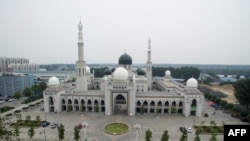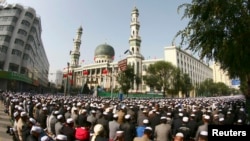Beijing’s Doudian Mosque, the largest Islamic house of worship in northern China, is the latest architectural landmark to be transfigured under Beijing’s Sinicization program aimed at downgrading or eliminating foreign religious influences from the country.
According to Hong Kong's Sing Tao Daily, the original Arabic-style dome of the mosque was replaced by five Chinese-style white round spires during a major renovation completed in April. Two moonlit minarets to the north and south of the worship hall were also demolished.
Various slogans can now be seen throughout the mosque, including "socialist core values," and "Study and implement the spirit of the 20th National Congress of the Chinese Communist Party.”
Another slogan provides what may be the strongest indication of the thinking behind the architectural revisionism: "Adhere to the direction of Sinicization of religions in China."
Formerly, not controversial
The Arabic features of the towering structure — spanning nearly 15,000 square meters and capable of accommodating 1,500 worshippers at a time — were not controversial when the mosque was completed just 10 years ago.
The architecture was recognized at the time by Wang Zhengwei, then-director of the State Ethnic Affairs Commission of China, who had always supported traditional ethnic regional autonomy, according to Shih Chien-yu, a researcher at Taiwan's Society of Central Asian Studies.
Dongguan Mosque transformed
But as Chinese leader Xi Jinping accumulated power, instructions were given to “rectify” mosques with Islamic features, Shih said. The 700-year-old Dongguan Mosque in Xining, Qinghai province, was among the most famous to be transformed, its distinctive domes and minarets toppled in 2021.
Similarly, the Islamic symbols and folk culture of mosques across China have been steadily eliminated since China launched the Sinicization program targeting Muslims outside Xinjiang in 2018, according to the human rights publication Bitter Winter.
Dilshat Rishit, spokesman for the World Uyghur Congress, lamented the change in the Doudian Mosque’s character in an interview with VOA.
"China transformed the Arabic style into what China considers to be a Chinese style. And when you look at it, you call it a temple, but it is not a temple, and you call it a mosque, but it is not a mosque,” he said.
Shih said the Xi government feels threatened as more Chinese turn to religions other than Taoism and Buddhism, with their deep roots in China.
“After Xi came to power, he believed people would no longer see the [Chinese Communist Party] as their ultimate belief, threatening the CCP," he said.
Practices affected
Chinese authorities have not only forced mosques to “rectify” but are also committed to changing the practice of foreign-originated religions. In Xinjiang, for example, while authorities have not explicitly prohibited fasting during the Muslim holy month of Ramadan, many believers have reported they will face retaliation if they fast.
In August 2021 in Hebei province, Xi proposed adhering to the Sinicization of religion and guiding religion to adapt to a socialist society, the Xinhua News agency reported.
Uniting "all the sons and daughters of China at home and abroad ... requires adhering to the direction of the Sinicization of religions in China, actively guiding religions to adapt to the socialist society, uniting religious believers and maximizing the strength of working hard together," Xinhua said.
Shih said the authorities even control the way believers recite the Quran.
"According to Muhammad, the Quran should be read in Arabic,” he said. “The Chinese government thinks it is a very bad influence. It thinks that religious schools are influenced by foreign forces."
Dilshat believes that if the Chinese authorities continue to suppress foreign-originated religious beliefs, it will “only further exacerbate the turmoil.”
“People would be desperate to defend their beliefs,” he said. “If China furthers its extreme policies to eliminate beliefs, it will intensify tension and lead to protests and conflicts."
Adrianna Zhang contributed to this report.





